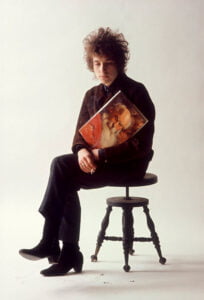…You’ll shut your eyes, not to see, through the glass,
Grimacing shadows of evening,
Those snarling monsters, a crowd going past
Of black wolves and black demons…
Arthur Rimbaud, A Winter’s Dream
…It dawned upon her gradually that the world was being picked to pieces, and put together on new and, according to the talkers, on infinitely better principles than before, that religion was in a fair way to be reasoned into nothingness, and intellect was to be the only God…
Louisa May Alcott, Little Women
…I put a spell on you/ Because you’re mine…
Screamin’ Jay Hawkins: I Put a Spell on You
CRAWL OUT…
Can You Please Crawl Out Your Window was released as a standalone single in December 1965. In terms of its musical construction and the biting tone of its lyrics, it is very much a follow up to Like a Rolling Stone and Positively Fourth Street, both of which had charted respectably. Can You Please, however, was only a very minor hit. This is not surprising, as it is a quirkily uncommercial song with a rather convoluted chorus which can hardly be called ‘catchy’. Dylan made several attempts at recording it during the Highway 61 and Blonde on Blonde sessions. The released version featured his current touring band, consisting of four members of what would later become The Band, with Paul Griffin on additional piano and Bobby Gregg on drums. The recording confirms Dylan’s immersion in and experimentation with a bluesy rock sound. The music has a slightly chaotic and ‘jumpy’ feel to it (which ties in with the continually disarming lyrics) that fascinated Jimi Hendrix, who played it live in a number of his shows. It would certainly never have functioned effectively as an acoustic song.

CRAWL OUT YOUR WINDOW
What really distinguishes Can You Please Crawl its razor sharp lyricism. It three verses are crammed with radically striking imagery that shows the influence of surrealism and symbolist poetry. The narrator seems to be a rather jaundiced figure who takes it upon himself to give advice. The main subject of the song is a manipulative, controlling man who appears to be exercising what could almost be called a demonic power over the person receiving the advice. We may assume that the ‘victim’ is a woman, although this is far from certain. This may be a song in which the narrator is imploring an abused woman to leave her tormentor. Or it may be that the manipulation is on a political, religious or psychological level. Fundamentally the song is an appeal to the oppressed person (or people) to assert themselves. Yet despite its rather dark subject matter, it also has an undercurrent of ironic humour, with Dylan clearly revelling in the song’s highly distinctive use of language.

The description of the song’s main subject crackles with striking images and weird, distorted epithets. We hear that …He sits in your room, his tomb, with a fistful of tacks… The internal rhyme ‘room/tomb’ is especially striking, creating a ghoulish air. The idea of someone holding a ‘fistful of tacks’ (and thus deliberately hurting themselves) implies that this man is not only deeply frustrated and angry but quite willing to extend his self-imposed pain to others. He is …precoccupied with his vengeance… a quality that may remind us of Hamlet, or one of Edgar Allan Poe’s twisted, obsessive progenitors. He is said to be …cursing the dead that can’t answer him back…, a vivid evocation of futility mixed with blind religious belief. We can almost imagine him to be like Richard III, Scrooge or Gollum from Lord of the Rings – a character who has been ‘eaten up’ by possessiveness, pride or vanity. Like Hamlet, he seems completely self-absorbed. Dylan conveys this with great eloquence in the remarkably spiky lines that follow: …I’m sure he has no intentions/ Of looking your way, unless it’s to say/ That he needs you to test his inventions… Perhaps he is some kind of Dr. Frankenstein figure (or even a Joseph Mengele), whose only use for the person being addressed is her ‘body parts’. If she is in a relationship with him, she clearly does need to escape. Dylan’s use of rhyming is especially inventive here, – coupling ‘intentions’ with ‘inventions’. The use of internal rhyme is again rather jarring, as if inviting the listener to continually pause and examine the character from another angle.



The song has three repeated choruses. In the ‘official’ lyrics the first line is the title phrase …Can you please crawl out of your window?… But this is actually difficult, even for Dylan, to fit into the rhythmic structure of the line, so he sings …Hey! Come crawl out your window… encouraging her to escape from the clutches of this rather scary figure. The following line has a particularly unusual verbal construction: …Use your arms and legs, they won’t ruin you… He seems to have been participating in some kind of discussion with her, in which she has justified not making her escape for fear of retribution …How can you say he will haunt you?… he asks rhetorically. The use of ‘haunt’ even suggests that he may be a ghost – perhaps a ‘phantom’ from her past – the memory of whom is holding her back. The last line is the rhythmically complex and surprising …You can go back to him any time you want to… Perhaps the narrator is giving her some leeway to make her own choices here, although he seems to be strongly pointing her towards the idea of escape. It may be that the last line is nothing but a sarcastic riposte, acknowledging the fact that she seems inexorably drawn to her manipulator.

The next lines are particularly surreal: …He looks so truthful, is this how he feels/ Trying to peel the moon and expose it… giving the impression of possible megalomania as the man exercises his power even over heavenly bodies. This is followed by the wonderfully evocative …With his businesslike anger and his bloodhounds that kneel… Dogs, of course, do not generally kneel, so one may assume that the ‘bloodhounds’ are human – perhaps other people he is controlling. This phrase is memorably juxtaposed against the marvellously prosaic phrase ‘businesslike anger’, suggesting that – like a Mafia boss – his feelings will always be sublimated to a devotion to ‘business’. The following line delivers another surreal twist …If he needs a third eye, he just grows it… This is the first real comic intervention. The idea of a ‘third eye’ emanates from Hinduism, in which it represents perception beyond everyday sight. Given that ‘growing an eye’ is obviously impossible, we now get the impression that the man may be some kind of pseudo-religious trickster. The verse again builds through canny internal rhyming to indicate his manipulative nature: …He just needs you to talk, or hand him his chalk/ Or pick it up after he throws it… Again the rhymes are particularly audacious. Now Dylan sounds more sarcastic than ever. The reference to ‘chalk’ may position him as some kind of teacher, perhaps one who is prone to throw bits at inattentive students.

By now it is impossible to characterise this ‘villain’ in any conventional way, although he is clearly a figure who has some kind of strong physical, emotional and spiritual power. In the final verse, his complex identity is further questioned …Why does he look so righteous while your face is so changed… with its rather jarring use of the term ‘righteous’, again suggests that the man may be some kind of religious charlatan or hypocrite, sure of his own moral superiority over others. He certainly seems to have considerable sway over her. The following lines are particularly strange and challenging. The narrator first asks the bizarre question …Are you frightened of the box you put him in?… This may even indicate that the man is not real, just a fragment of her imagination. Her fear seems to be an internal one. She is not said to be frightened of him but of the way she herself has categorised him. Perhaps he is, in fact, her creation. The lines that follow juxtapose words in a highly suggestive way: …While his genocide fools and his friends rearrange/ Their religion of little tin women… These again appear to a scathing comment on spiritual manipulation, leading to the worship of false idols. The phrase ‘genocide fools’ is especially distinctive, suggesting that the man’s controlling instincts may have horrifying consequences. The enticing and perhaps terrifying final supplication …Come on out, the dark is just beginning… is particularly ominous.

In Can You Please Crawl Out Your Window Dylan glories in the judicious use of unusual words and phrases, giving the language a barbed venom that he rarely comes close to matching. In some ways the song anticipates Dylan’s fractured ‘cubist’ narratives of the 1970s like Tangled Up in Blue, in which the focus shifts mysteriously and sometimes apparently randomly between different aspects of the characters. Although it has the kind of lyric that can never to be tied down to one specific meaning, it communicates powerfully through the sheer poetic adventurousness of its language. It hints at horror, creates threats and makes sarcastic jibes, often in the same line, while hinting at the way that people can be manipulated by false religions and beliefs. The choruses constantly attempt to persuade the woman (assuming it is a woman) to escape from this malignant presence but there is no indication she will do so. His power over her is so great that she can – and probably will – ‘go back to him any time she wants to’.




Leave a Reply